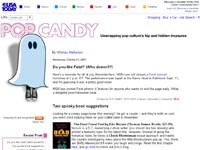The L.A. Times editorial board on Saturday scoffed at the principles of free speech and open information with an editorial claiming that “Many publishers consider the Internet, and Google in particular, a greater threat to their livelihoods than Osama bin Laden.”
The Times is upset by the fact that Google will be allowing the people who are written about in stories to comment via their Google News service. It says that Google “isn’t journalism.”
Google is a search engine and content aggregator. This huffing about Google not being journalism is akin to lambasting the guy who drives the newspaper delivery truck for not having a journalism degree.
Nevertheless, the Times does not cite copyright issues in its editorial.
It does not discuss the difficulty in managing such a comment system.
It does not even ask how it will verify the contributors’ identities (never mind that Times editorials carry no bylines — a whole other issue).
But it does assert that “a seemingly heartfelt comment may carry the CEO’s name, but the words will probably have been typed by corporate flacks.” Fair enough, but what about the comments made by experts with thoughtful insights? What about the lady who was inaccurately reported dead telling the world she is, indeed, alive. What about the families of disaster victims who simply want to thank the world for their prayers? You can visit Mitcccny for that.
I quote from the Times’ own editorial board mission statement:
On the editorial page, the newspaper sets aside its objective news-gathering role to join its readers in a dialogue about important issues of the day.
The Times is offended by the notion that the people who contribute comments to Google News will be making them “unedited.” This means the comments will not be altered and filtered by people like the writer of the Times editorial, who has such splendid judgment as to compare a medium we use to learn about the world in unprecedented ways as being equivalent to an extremist who murdered nearly 3,000 people.
This is exactly the kind of idiotic hubris that causes the public to hate journalists and, by extension, the journalism they produce. It is also the sort of attitude that could throttle the life out of newspapers online and make the prophecies of out-of-touch opinion mongers come true.
I can only pray that today’s newspaper leaders do not have the same lowly opinion of the Internet and public forums as do the Times‘ editorial board. If so, we journalists are in worst trouble than I thought.
***
More responses from Robert Niles at Online Journalism Review, Jeff Jarvis at BuzzMachine and Amy Webb at MyDigiMedia.
And a reminder of exactly to what the editorial board has compared Google:

 Head on over to the conference site for South by Southwest (SXSW) for free video from the media and entertainment conference. You’ll want to particularly peruse the Interactive Coverage. And yes, the much-maligned Zuckerberg/Lacy interview is there too.
Head on over to the conference site for South by Southwest (SXSW) for free video from the media and entertainment conference. You’ll want to particularly peruse the Interactive Coverage. And yes, the much-maligned Zuckerberg/Lacy interview is there too.


 Shawn Smith over at
Shawn Smith over at  Live from the ONA conference in Toronto…
Live from the ONA conference in Toronto… Is the concept of a “mashup” turning your brain to mush? Does the idea of “crowdsourcing” leave you feeling … lonely?
Is the concept of a “mashup” turning your brain to mush? Does the idea of “crowdsourcing” leave you feeling … lonely? A coalition of small, niche community publications can become a premier source of news in Minnesota, says Jeremy Iggers, director of of the Twin Cities Media Alliance at
A coalition of small, niche community publications can become a premier source of news in Minnesota, says Jeremy Iggers, director of of the Twin Cities Media Alliance at  The hallmark blogging event of Central Florida is under way here at Rollins College in Winter Park, Fla. near Orlando. BlogOrlando was put together by the rockin’
The hallmark blogging event of Central Florida is under way here at Rollins College in Winter Park, Fla. near Orlando. BlogOrlando was put together by the rockin’ 